Annie Walke
Annie Walke or Anne Fearon Walke (1877 in Banstead, Surrey – 1965 in Penzance) was an English artist.[1][2][nb 1] Anne Fearon grew up and was schooled in Banstead, Surrey. After completing her studies at the Chelsea School of Art and the London School of Art, she and her sister, Hilda Fearon,[3] furthered their studies in Dresden, Germany. About the turn of the 20th century Miss Fearon settled in Cornwall, where she continued her studies and established a studio in the Cornish coastal village of Polruan. After she married Nicolo Bernard Walke in 1911, she soon moved with him to St Hilary, Cornwall. where her husband became the vicar in 1913. She was a member of the Newlyn School and other artists' organizations and created portraits and religious works for churches. Her work has been exhibited in England, Paris, America and South Africa. In the latter part of her life Walke was a published poet.
Annie Walke | |
|---|---|
| Born | Anne Fearon 1877 Banstead, Surrey, England |
| Died | 1965 |
| Nationality | English |
| Education | Cheltenham Ladies College, Chelsea School of Art, London School of Art |
| Known for | Painter |
| Spouse(s) | Nicolo Bernard Walke |
Personal life
Anne Fearon was born in 1877 in Banstead, Surrey (just outside what is now the border of Greater London),[1] one of six children born to Edith Jane Duffield Fearon and Paul Bradshaw Fearon, a successful London wine merchant. One of the four girls was a sister named Hilda, also an artist,[nb 2] who was born the year after Anne's birth.[2]
Anne attended the Cheltenham Ladies College, Chelsea School of Art and the London School of Art. She exhibited her paintings at the Royal Academy and other venues in London. Her instructors included Sir William Orpen, Augustus John and Sir William Nicholson. After Anne and Hilda finished their formal studies in the London area, they travelled together for additional education in Dresden. Between about 1902 and 1904 she may have joined her sister in St Ives, Cornwall.[1][2]
- Example of works of her instructors
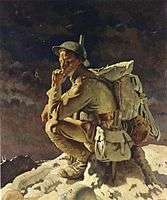 Sir William Orpen, The Thinker, 1918
Sir William Orpen, The Thinker, 1918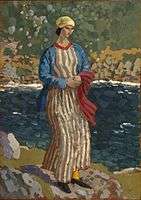 Augustus John, Woman by a Riverbank, 1910–1912, Brooklyn Museum
Augustus John, Woman by a Riverbank, 1910–1912, Brooklyn Museum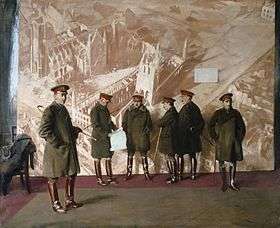 Sir William Nicholson, Canadian Headquarters Staff, 1918, Canadian War Museum, Ottawa
Sir William Nicholson, Canadian Headquarters Staff, 1918, Canadian War Museum, Ottawa
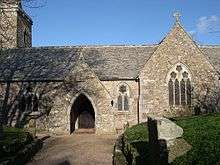
She married Nicolo Bernard "Ber" Walke, already an Anglican priest, in 1911 while he was a curate at Polruan where she had established a studio.[5] Bernard Walke was appointed St Hilary Church's vicar in 1912, but not instituted to the living until 1913. He remained vicar until 1936.[1][6] The couple was described by Newlyn School artist Laura Knight:
They were both long and thin, and Ber always wore dandy silk socks - he was not in the least like a parson to look at. A man with ideals that he lived up to-he was big - hearted enough to understand anyone and had it in him to enjoy vulgar fun as much as any. After we became intimate we often went to stay with the Walkes at St Hilary, as simple as any monastery in its furnishings.[2]
The couple had no children. After Ber retired the couple settled in Mevagissey at The Battery. Bernard died on 25 June 1941 and was buried in Lelant Churchyard, near St Erth and St Hilary. Annie Walke remained at their home and continued painting until about 1950. After that, she wrote and had one book published in 1963. Anne Walke died in 1965 and was buried at St Erth.[2][6]
Career
About 1904 she set up a harbour-facing studio in Polruan, a southern Cornwall coastal town. Over her career she painted murals, figures and portraits. She was a member of the Royal Society for the Encouragement of Arts, Manufactures and Commerce, Newlyn Society of Artists and the St Ives Society of Artists.[2]
In St Hilary Walke fashioned an artist's studio out of a horse's stable, bringing in extra light, wooden floors and an exterior garden. Of her work space it was said:
In this quiet unobtrusive little place, surrounded by tall shrubs, while the famous bells rang over the peaceful garden, the painter meditated and produced quiet-toned pictures of saints and portraits of distinction.[7]
Newlyn School
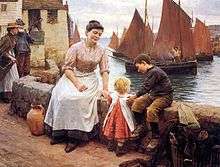
Walke met Laura Knight at an exhibition in Newlyn, but Annie and Bernard met more individuals from the Newlyn School through introduction by Alfred Munnings in 1915.[8] Walke was a member of the Newlyn School, an artist colony in the Newlyn area of Cornwall.[9] Because of his close association with area artists, her husband's book Twenty years at St Hilary is often used to research information about Cornwall artists.[2]
The Jesus Chapel at Truro Cathedral, built at the expense of Bishop Walter Frere, was decorated by Annie Walke. The reredos depicts Christ in alb and girdle in the central panel, surrounded by scenes of various Cornish industries.[10]
St Hilary Church commissions
Although the medieval St Hilary church was rebuilt in 1853, it lacked interior decoration.[11] Works by Annie and some of their artist friends, like Laura Knight, Dod Procter, Ernest Procter, Harold Harvey, Roger Fry and Phyllis ("Pog") Yglesias were commissioned to decorate the church. These artists from the "Lamorna Group",[nb 3] created altar pieces, panels and other works.[1][2] Among the works were some depicting a number of the Cornish saints.[11]
One of Annie's works for the church was a Joan of Arc painting that was placed just inside the south door of the church. Ernest Procter made a work that depicts St Mawes, St Kevin and St Neot for the pulpit and a reredos of the Altar of the Dead. Annie, Dod and Ernest Procter, Gladys Hynes, Alethea and Norman Garstin and Harold Knight all made paintings for the sides of the stalls in the church. Pog Yglesias made the north wall's crucifix and nearby is Roger Fry's reredos. 12-year-old Joan Manning Saunders made the painted pictures for a chancel screen.[13] The church "became one of the most notable shrines in the country."[6]
Works
Paintings
Her works include:
|
|
Works for churches
|
For Truro Cathedral
|
She has also commissioned work from
|
Exhibitions
Her work was shown at the following exhibitions:[2]
|
After her death, her works were exhibited at the following group exhibitions:
|
Publications
- A Boy Returns: and other poems. Haywards Heath, Sussex : Breakthru Publications 1964[27]
- A selection of seven poems by the artist Annie Walke (1877–1965), Camborne (44, Trecarrack Road, Pengegon, Camborne, Cornwall): Philip Hills 2000.[28]
The books are available at the Cornwall Centre.
Notes
- Cornwall Artists gives her year of birth as 1877 and her place of birth as Banstead, Surrey. There are other sources, such as Penlee, that give her year of birth as 1888, but that has to be wrong as she'd be 14 by the time she may have visited her sister in St Ives about 1902.[2]
- Hilda studied at the Slade School of Fine Art. After studying at Slade and in Dresden, Hilda lived in St Ives, Cornwall from about 1900. There she lived at "The Cabin", currently a rental cottage, and studied under Gertrude and Algernon Talmage. About or after 1904, she moved to London.[2][4]
- The Lamorna Group included artists of the Newlyn School in the Lamorna valley.[12]
- Made with "typical 1930s stylisation."[26]
References
- Anne Walke. Penlee House Museum and Gallery. Retrieved 1 October 2012.
- Annie Walke. Cornwall Artists. Retrieved 1 October 2012.
- Tate Gallery Artist page: Hilda Fearon
- The Cabin. Boutique Retreats. Retrieved 2 October 2012.
- Walke, Bernard (2002) Twenty Years at St Hilary. Mount Hawke: Truran, pp. 5-6, 12, 152
- Claughton Pellew; Anne Stevens; Ashmolean Museum. Claughton Pellew: wood engravings : Ashmolean Museum, Eldon Gallery, 16 September-22 November 1987. Ashmolean Museum; September 1987. p. 14.
- David Tovey; Penlee House Gallery & Museum. W.H.Y. Titcomb (R.B.A., R.W.A., R.B.C., R.I.): Bristol, Venice and the continental tours : the second part of the biography of William Titcomb dealing with the years 1909-1930 published to coincide with the exhibition, A Newlyner from St Ives, organised by Penlee House Gallery and Museum, Penzance 12th April - 7th June 2003. Wilson Books; 11 April 2003. ISBN 978-0-9538363-2-1. p. 182.
- Melissa Hardie. 100 Years in Newlyn: Diary of a Gallery. Hypatia Publications; 1 June 1995. ISBN 978-1-872229-22-5. p. 1915.
- George Bednar. Every Corner was a Picture: 120 Artists of Newlyn and the Newlyn Art Colony 1880-1990. Truran Books; November 2004. ISBN 978-1-85022-192-0.
- Phillips, C. S., ed. (1947) Walter Howard Frere, Bishop of Truro: a memoir. London: Faber & Faber; pp. 83-84
- "Reverend Bernard Walke and His Mother." BBC. Your Paintings. Retrieved 2 October 2012.
- The Artists. Lamorna Society. Retrieved 1 October 2012.
- Melissa Hardie. 100 Years in Newlyn: Diary of a Gallery. Hypatia Publications; 1 June 1995. ISBN 978-1-872229-22-5. p. 1915. Note: previous page to where this link lands, ironically not a page 1914.
- Lot 104 The Annunciation. UK Auctioneers. Retrieved 2 October 2012.
- The Black Boat MutualArt. Retrieved 2 October 2012.
- Lot 101 Head and shoulder portrait of a woman. UK Auctioneers. Retrieved 2 October 2012.
- London Child II. Invaluable. Retrieved 2 October 2012.
- London Child II. Sworders. Retrieved 2 October 2012.
- Portrait of a gentleman in a Spanish cloak. Invaluable. Retrieved 2 October 2012.
- Lot 102 Questioning the man born blind. UK Auctioneers. Retrieved 2 October 2012.
- Ann Fearon Walke - Sorrowful Women Arcadja. Retrieved 2 October 2012.
- Lot 103 Thou Art Peter. UK Auctioneers. Retrieved 2 October 2012.
- Toilers. Invaluable. Retrieved 2 October 2012.
- White Tulips. Penlee House Museum and Gallery. Retrieved 1 October 2012.
- Painted by Annie Fearon Walke. BBC. Your Paintings. Retrieved 2 October 2012.
- David Tovey; Penlee House Gallery & Museum. W.H.Y. Titcomb (R.B.A., R.W.A., R.B.C., R.I.): Bristol, Venice and the continental tours : the second part of the biography of William Titcomb dealing with the years 1909-1930 published to coincide with the exhibition, A Newlyner from St Ives, organised by Penlee House Gallery and Museum, Penzance 12th April - 7th June 2003. Wilson Books; 11 April 2003. ISBN 978-0-9538363-2-1. p. 53.
- A Boy Returns: and other poems. Cornwall Council. Retrieved 2 October 2012.
- A selection of seven poems by the artist Annie Walke (1877–1965). Cornwall Council. Retrieved 2 October 2012.
Further reading
- Caroline Fox; Francis Greenacre; Barbican Art Gallery. Painting in Newlyn, 1880-1930. Barbican Art Gallery; 1985.
- Philip C. Hills. Bring Back the Donkeys: Booklet to the Exhibition 'A tribute to Father Bernard Walke and the artist Annie Walke': covering the years 1870-1965. Philip C. Hills, 1997. Note: The exhibition was at Jesus Chapel, Truro Cathedral, 18 December 1997 – 2 January 1998. Available at Cornwall Centre.
- Philip C. Hills. A Cornish Pageant. Camborne (44 Trecarrack Road, Pengegon, Camborne, TR14 7UQ): Philip Hills 1999. Available at Cornwall Centre.
- Margaret Laird. "Christ in the Cabbage Field." New Directions, April 2010. p. 33. Note: Regarding Walke's work at Truro Cathedral.
- Michael Yelton. Anglican Papalism: A History: 1900-1960. Canterbury Press in association with the Society of the Faith; 30 September 2005. ISBN 978-1-85311-655-1.
- Bernard (Ber) Walke
- Donald Allchin, Bernard Walke: A Good Man Who Could Never be Dull. Three Peaks Press, 1 August 2000. 28 pages. ISBN 190209302X
- Ralph Gifford. "The story of playwright and controversial priest Bernard Walke at St Hilary Heritage Centre." Culture 24, Cornwall, 4 October 2011.
- Bernard Walke. Twenty Years at St Hilary. Mount Hawke: Truran, 2002.
External links
- White Tulips, Penlee Museum and Gallery
- Annie Walke (Anne Fearon Walke) works
- 5 paintings by or after Annie Walke at the Art UK site
- Ann Fearon WALKE works